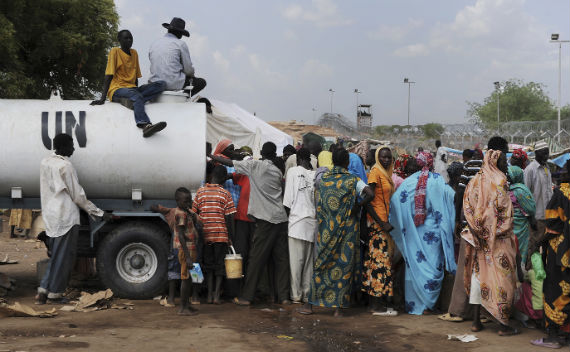Sudan: Conflict in South Kordofan Worsens
More on:

Yesterday, leaders from northern and southern Sudan signed an agreement (pdf) that demilitarizes Abyei, the disputed region that Sudanese Armed Forces invaded on May 20, and deploys a new Ethiopian peacekeeping force to the area, the Interim Security Force for Abyei (ISFA). Secretary of State Clinton thanked South African mediator Thabo Mbeki and claimed the diplomatic agreement represented “an important first step.”
But, it was only one step in one of Sudan’s conflicts and does not address the "ethnic cleansing" that has reportedly taken place under the auspices of the Khartoum security services. In recent days, the strife in South Kordofan state (which is in the North) has produced unsettling reports from journalists on the ground, Sudan experts abroad, and new satellite imagery from the Sudan Sentinel Project (SSP). Approximately sixty thousand people have fled the conflict in the Nuba mountains, some retreating to caves to avoid the aerial bombardment from Sudanese Armed Forces (SAF). In a report released on June 17, SSP indicates eighty-nine SAF military vehicles in Kadugli, the capital of South Kordofan. As the northern army sweeps into the region, other reports suggest ethnically-targeted violence toward Nubans, a population of “black Africans” in the ethnically heterogeneous state that includes large “Arab” populations. Humanitarian organizations have limited access to the region.
Last week, I posed the unfortunate question: is Sudan on the verge of another conflict tantamount to Darfur? Sudan experts and the recent media reports have affirmed that possible scenario. This week, perhaps it is better to ask a more historical question: will the Nuba face yet another conflict, and how will that effect southern independence on July 9?
The situation in South Kordofan, though spurred by the northern military’s “control” of the region on June 5, is hardly new. In fact, some of the Nuba--a largely agricultural community that practices Islam, Christianity, and other religions--fought against northern Sudan during the civil war and have faced issues of political recognition ever since. During the 1990s, Khartoum reallocated land to the pastoralist groups in the region and meted out colonial-era divide and rule (pdf) land reallocation schemes to pit the “Arab” and “black” groups against one another. There were likely economic implications to the land deals, as Nuba tend to be sedentary farmers and the Baggara cattle herders.
The situation in South Kordofan has parallels—the complex combination of identity politics, land grievances, economic concerns, and geographic boundaries—that beset many other regional conflicts on the continent. But, there is an unsettling difference that makes this conflict unique: southern Sudan will secede from the North in less than twenty days.
More on:
 Online Store
Online Store